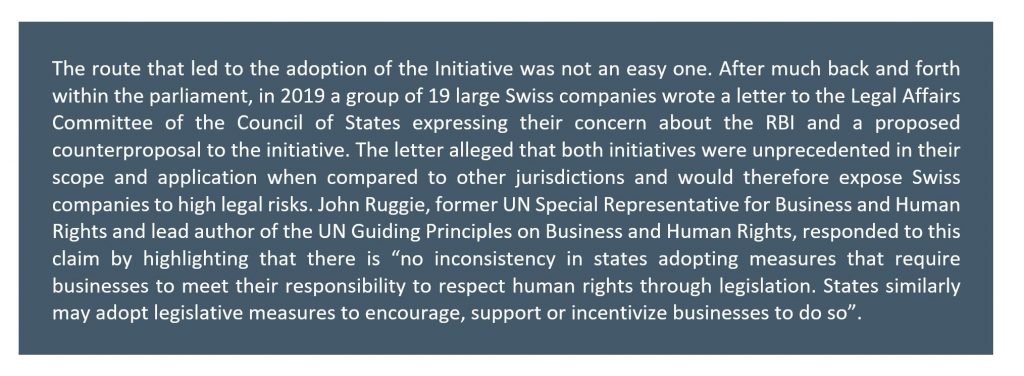ISSUE NO. 21: THE SWISS RESPONSIBLE BUSINESS INITIATIVE: OUR COMMENTARY
The Swiss Responsible Business Initiative (RBI) is a national initiative that aims to hold companies legally accountable for incorporating respect for human rights and the environment in their everyday business operations through a due diligence process. The mandatory due diligence process suggested in the initiative is based on the United Nations Guiding Principles on Business and Human Rights.
This initiative, which was submitted before the Swiss Parliament in 2016, follows the footprints of its French neighbor’s Duty of Vigilance law adopted in 2017.

The counterproposal, which was ultimately adopted at the end of June 2020, is far from the holistic approach encompassed in the original RBI. Some key the features of the adopted text include:
- Mandatory due diligence is limited, as it only refers to binding provisions under international law ratified by Switzerland, whereas the original RBI included all internationally recognized human rights and environmental standards. For reference, Switzerland is not a party to the International Convention on the Protection of the Rights of All Migrant Workers and Members of their Families.
- The adopted version explicitly excludes all duties to protect or responsibility for state maladministration.
- The liability is limited to life, limb and property and liability for natural persons is excluded, whereas the original version included liability for human rights violations and environmental pollution.
- Only very large companies (those with a total balance sheet of more than of CHF/USD 40 million, a turnover of CHF/USD 80 million and/or 500 or more full time employees) are covered, with some exceptions for companies with particularly high risks (independent of size) but also exceptions for large companies with significantly low risks. The high/low risk thresholds are set to be defined by the Swiss government in a decree.
- Swiss parent companies are only liable for their subsidiaries (national or foreign) and only when control is really exercised. This could create a dangerous loophole for oversight and responsibility down the supply chain.
- The original RBI planned to have a constitutional article dedicated to the subject with the implementation processes set out in a special act. Instead, the counterproposal looks more like what some have qualified as a “patchwork” in the Swiss Code of Obligations and the Swiss Civil Code.
As a last resort and according to Swiss procedures, the RBI will be going through a public referendum in the next couple of months. Should the initiative be dismissed by the population, the counterproposal will enter into force.
News & Notes

Acorn International
1702 Taylor St, Suite 200B
Houston, TX 77007, USA
1213 Purchase St
New Bedford, MA 02740, USA
